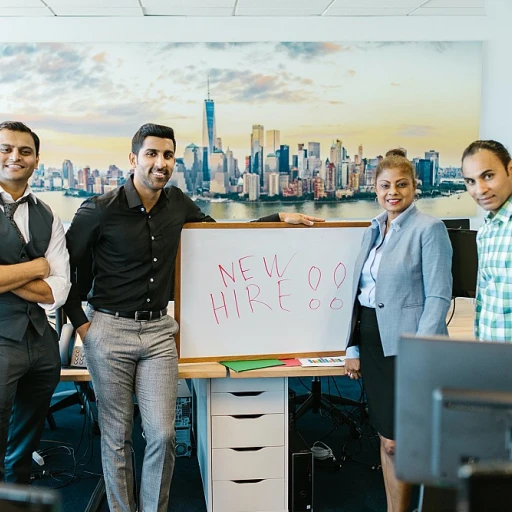Understanding Employer Branding
Decoding the Concept of Employer Branding
Employer branding is a powerful strategy that companies use to shape their image as a desirable employer. This is achieved through an intentional portrayal of the company culture, values, and work environment, which ultimately helps in attracting top talent. By creating a strong employer brand, organizations not only enhance their recruitment efforts but also improve employee engagement and retention, fostering a positive workplace culture.
A company with a strong brand sends a message across all platforms, including social media, emphasizing company values and a supportive work environment. Potential candidates are more likely to apply for jobs at organizations known for their attractive workplace culture and values. Top talent seeks out employers that align with their own values, making employer branding a game changer in the competitive recruitment landscape.
The impact of employer branding extends beyond attracting new employees. It contributes to a powerful workplace culture that current employees value. Talent acquisition is no longer just about filling a position; it's about building an engaged and productive workforce that resonates with the company’s mission and values.
The importance of this branding can be seen in its relationship with reskilling initiatives. A company's commitment to nurturing and developing employees' skills further cements its image as a forward-thinking employer. To deepen your understanding of how these aspects interconnect, exploring how pay equity initiatives contribute to reskilling can provide valuable insights into optimizing employer branding.
Exploring the Role of a Pay Equity Consultant in Reskilling highlights this crucial link.
In a world where job seekers are more informed than ever, maintaining a strong brand can elevate a company’s standing and make it a place where people want to work, ultimately driving long-term success.
The Role of Employer Branding in Recruitment
The Influence of an Employer's Brand in Attracting Talent
Understanding the impact of employer branding within the recruitment process is crucial for companies aiming to attract top talent. When a potential candidate considers applying for a job, the employer brand significantly shapes their perception. A strong employer brand highlights the company's workplace culture, values, and the overall work environment, which are key factors that job seekers evaluate.
Firstly, companies can showcase their unique culture values and strong workplace culture through various platforms, primarily utilizing social media. This visibility often leads to a positive candidate experience. As a result, job seekers are more likely to apply, increasing the pool of potential candidates. Companies that excel in projecting their branding efforts through social media are often recognized as top places to work.
Moreover, an employer brand also affects employees currently within the company. When employees feel engaged and connected to the company values, they become advocates, naturally promoting the brand, which, in turn, attracts more talent. Employee engagement is thus a cornerstone of strong employer branding.
However, it's not just about attracting talent; it's about ensuring the alignment of candidates with the company's mission and vision. A well-articulated employer brand ensures that candidates who resonate with the brand's values and culture are more likely to apply, which streamlines the recruitment process and enhances talent acquisition. Companies that highlight this alignment during recruitment are better positioned to secure candidates who are not only qualified but also a cultural fit.
For understanding how employer branding intertwines with reskilling – exploring roles such as a
pay equity consultant in reskilling can offer insightful perspectives into maintaining fairness and progression opportunities throughout the recruitment and employee lifecycle.
Employer Branding and Reskilling: A Symbiotic Relationship
Employer Branding Amplifying Reskilling
In today’s rapidly evolving job market, the synergy between employer branding and reskilling has emerged as a significant advantage for organizations aiming to maintain a competitive edge. One crucial aspect of a strong employer brand is the commitment to investing in the growth and development of employees. This focus not only enhances the company culture but also positions the organization as a progressive and dynamic place to work.
The interplay between reskilling and employer branding revolves around several key elements:
- Attract Top Talent: By demonstrating a dedication to reskilling, companies exhibit their commitment to providing employees with ongoing learning and development opportunities. This appeal is particularly strong for top talent and potential candidates who are looking for more than just a job—seeking instead a workplace that values growth and adaptation.
- Elevate Company Culture: Reskilling efforts contribute to a positive work environment by fostering a culture that values learning and professional advancement. It enhances employee engagement, as individuals feel supported in their career growth, motivating them to contribute more effectively and align with the company's values.
- Enhance Candidate Experience: Potential candidates are increasingly evaluating employer branding efforts. A company's commitment to reskilling showcases its dedication to employee success and adaptability, creating a more attractive candidate experience. This aspect is particularly critical in an era where job seekers are driven by culture values and professional growth opportunities.
- Facilitate Talent Acquisition: As organizations face the challenge of attracting top talent in a competitive landscape, a strong employer brand that prioritizes reskilling can be a game changer. It underlines the employer’s resolve to prepare employees for new opportunities, aligning with the growing demand for continuous learning and skill adaptation.
By intertwining reskilling with employer branding, companies not only enhance their reputation but also build a resilient and adaptable workforce. The focus on continuous development through reskilling is no longer just an option but a necessity for thriving in the contemporary workplace culture.
For organizations committed to long-term growth, integrating reskilling into their employer branding strategy is a powerful move that promises sustained success both in talent acquisition and employee retention. For additional insights on preparing employees for new opportunities, consider exploring this
resource.
Strategies for Building a Strong Employer Brand
Building a Distinctive Employer Identity
Creating a strong employer brand involves a comprehensive approach aimed at enhancing the company's image as a preferred place to work. A positive and well-recognized employer identity can significantly bolster recruitment efforts by attracting top talent. This involves developing a workplace culture that resonates with both current employees and potential candidates.
Instilling Core Values
Instilling clear and compelling company values is crucial in solidifying a strong employer brand. These values should reflect the culture and goals of the organization, serving as guiding principles for the company. Ensuring that these values align with the day-to-day work environment can help candidates identify and connect with your brand, enhancing their overall candidate experience.
Leveraging Social Media and Communication Channels
Social media is an essential tool for communicating your brand's message and engaging with a wider talent pool. Consistency across different media platforms helps create a cohesive brand image and can significantly attract top candidates. Transparency in showcasing the company's achievements, workplace culture, and employee testimonials can reinforce the brand’s positive image.
Enhancing Employee Engagement
Fostering a culture that encourages employee engagement can lead to a strong employer branding. Employees who are engaged and satisfied with their work environment are more likely to act as brand ambassadors. This not only aids in recruitment but also in retaining top talent, creating a cycle of positive branding.
Crafting a Compelling Candidate Experience
A critical element is providing a seamless and engaging candidate experience from the initial recruitment phase through onboarding. This can be achieved through a well-structured recruitment process that reflects the brand's values and the positive aspects of your company culture. By ensuring that every touchpoint is a reflection of the brand’s strengths, companies can leave a lasting impression on job seekers.
Creating a strong employer brand is indeed a game changer in recruitment. It requires a strategic alignment of company values, a cohesive communication strategy, and fostering a work culture that values and engages employees. This holistic branding approach not only attracts top talent but also serves as a key driver for retaining employees and enhancing their satisfaction over the long term.
Challenges in Employer Branding and How to Overcome Them
Overcoming Challenges in Employer Branding
Building a strong employer brand is a strategic process that can significantly impact recruitment and retention. However, it doesn’t come without its fair share of challenges. Addressing these challenges effectively is crucial for maintaining an appealing and consistent employer brand.
1. Aligning Company Values and Culture
One major challenge is ensuring that the company’s values and workplace culture are not just words on paper but are actively demonstrated in daily operations. It requires a commitment to fostering an environment that supports those values, making it a place word and deed align. Companies need to work on enhancing their culture values to ensure employees resonate with them, thus creating a positive work environment that attracts top talent.
2. Maintaining Consistency Across Channels
With the proliferation of digital and social media, companies face the challenge of maintaining a consistent brand message across all platforms. Inconsistencies can lead to confusion among potential candidates and employees. A unified approach across social media channels and internal communications is necessary to strengthen the employer branding efforts.
3. Enhancing Candidate Experience
The recruitment process is the first touchpoint for potential candidates, making it essential to ensure a seamless candidate experience. Companies must implement efficient recruitment processes that are reflective of the positive workplace culture they aim to promote. Enhancing the candidate experience can be a game changer in attracting top talent.
4. Engaging Current Employees
Employee engagement plays a critical role in employer branding. Engaged employees who feel valued and part of the company are more likely to advocate for the brand, turning into genuine brand ambassadors. Companies need to invest in talent acquisition and retention strategies that encourage employee feedback and participation.
5. Measuring Branding Success
Quantifying the success of branding efforts remains a key challenge. Employers need to establish clear metrics and KPIs to track the performance of their branding strategies. This might include tracking improvements in employee engagement, recruitment metrics, and employee turnover rates. Continuous measurement and adjustment are vital for sustaining a strong employer brand.
By addressing these challenges head-on, companies can create an employer brand that serves as a magnet for top-tier candidates and a point of pride for current employees, ultimately enhancing their recruitment and retention efforts.
Case Studies: Successful Employer Branding in Action
Real-world Examples of Successful Employer Branding Strategies
In the increasingly competitive landscape of talent acquisition, companies must employ robust branding efforts to attract top talent and retain existing employees. Several companies have emerged as leaders in creating strong employer brand identities, and their strategies offer valuable insights.
- The Power of Company Culture: One prominent strategy seen across successful organizations is fostering a positive company culture. Organizations that prioritize their workplace culture and align it with their core values often report higher levels of employee engagement. This not only attracts potential candidates seeking a place where they feel their work has meaning but also retains the employees who resonate with the company values. For instance, a tech company renowned for its innovative culture regularly underscores its commitment to continuous learning and personal growth, which appeals to job seekers and employees alike.
- Social Media as a Branding Tool: Another effective approach is strategically using social media to project a strong employer brand. Companies leveraging platforms to share stories, achievements, and everyday work life can build a reputable presence. A leading media organization frequently shares authentic employee experiences and workplace achievements, enhancing its brand appeal. This approach not only raises its profile among potential candidates but also demonstrates a transparent work environment and culture values.
- Integration With Recruitment Strategies: Top companies seamlessly integrate their employer branding efforts into recruitment processes to create a cohesive candidate experience. A well-known retail giant, for example, emphasizes diversity and inclusion from the job application process through to onboarding, reflecting these values in their branding. By doing so, they create a sense of belonging and attract candidates who appreciate these efforts.
- Highlighting Work-life Balance: Companies that showcase a commitment to work-life balance often stand out in job seekers’ lists of desirable places to work. A healthcare company effectively communicates this value by offering flexible working arrangements and promoting them across various media platforms. This strong emphasis on work-life balance not only helps in attracting top talent but also sustains a high employee retention rate.
Applying these insights can enhance a company’s ability to attract and retain top talent, making employer branding a game changer in recruitment. The experiences of these successful companies highlight the importance of creating a compelling workplace culture and values that resonate well with both current employees and potential candidates.





